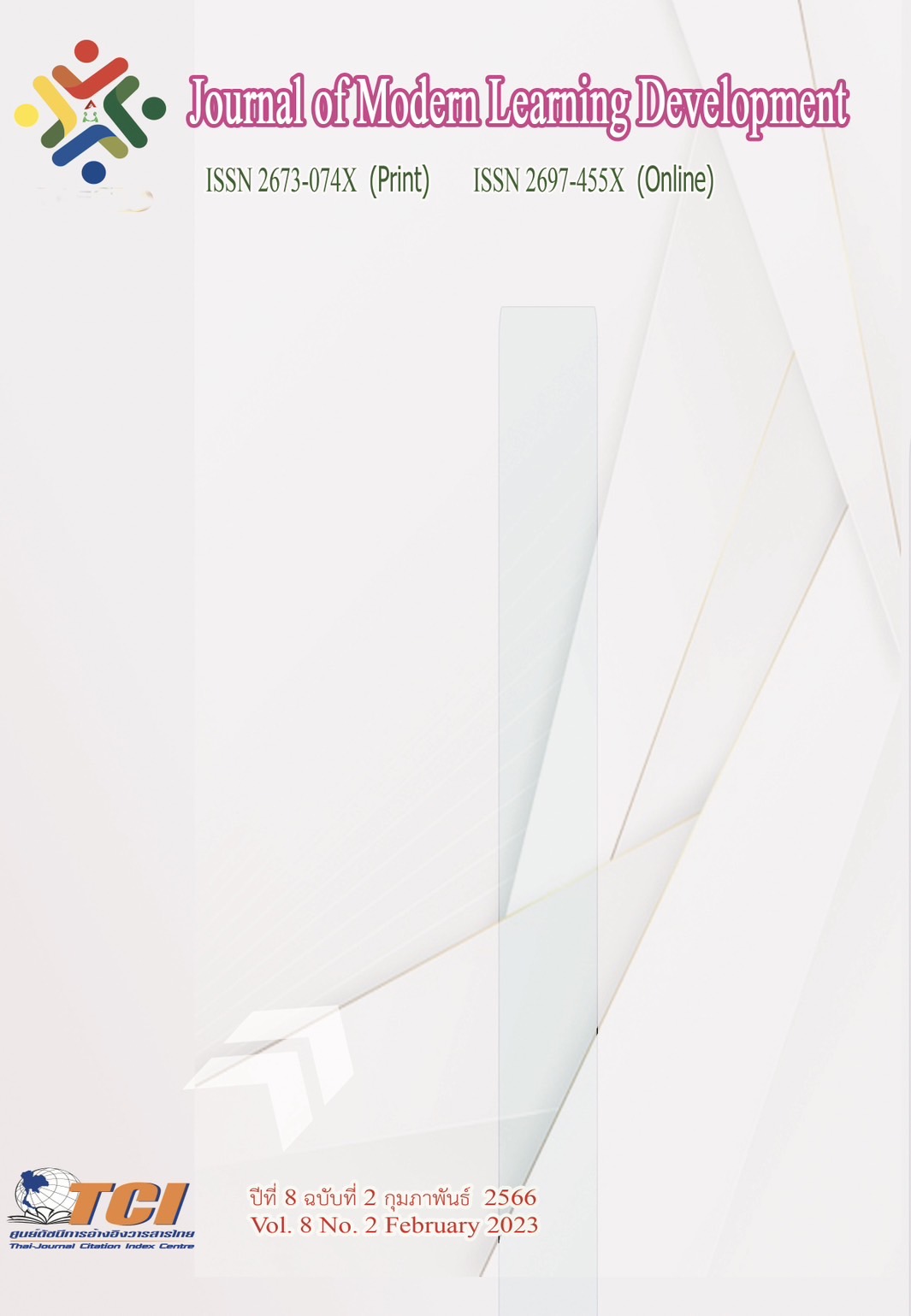The Development of Learning Management Models Based on the Concept of Experiential Learning Management in Combination with Social Service Learning to Promote Citizenship for Mathayomsuksa 4 Students
Main Article Content
Abstract
The research aims. 1) To study the basics of model development; 2) To develop a learning management model 3) To study the results of using the learning management model. and 4) To assess the learning management model. The instruments were used in this research were: 1) learning management model, 2) lessons plan, 3) citizenship assessment 4) achievement test 5) satisfaction questionnaire and 6) parents’ opinion questionnaire. Statistics used to analyze data include percentage, mean, standard deviation and t-test, the results showed.
1.The results of the basic data study showed that students had an opinion about the current condition and learning management to promote citizenship overall is at a low level ( = 2.37, S.D. = 0.59). and the need for learning management overall is at the highest level (= 4.54, S.D. = 0.54).
2. The results of the development of the learning management model showed that there are 4 learning management styles. The steps are 1) the problem stimulation stage, 2) the summary data collection stage, 3) the community service implementation stage, and 4) the exhibit and evaluation stage.
3. The results of the use of the learning management model show that students have developed citizenship higher at all stages and was significantly post-achievement test higher than pre-achievement test at the level of .05
4. The results of the assessment of the learning management style showed that the students were satisfied with the overall learning management model is at the highest level (= 4.53, S.D. = 0.61), and parents have the highest overall opinion on the learning management model (= 4.51, S.D. = 0.57).
Article Details
References
กิจฐเชต ไกรวาส และคณะ. (2018). รูปแบบการให้การศึกษาทางการเมืองเพื่อสร้างความเป็นพลเมืองในระบอบประชาธิปไตย. วารสาร ชุมชน วิจัย มหาวิทยาลัย ราชภัฏ นครราชสีมา. 12 (1), 228-244.
ชนาภา บูรณชาติ. (2561). ผลของการจัดกิจกรรมการเรียนรู้เชิงประสบการณ์ที่ส่งเสริมความรู้และความสามารถในการออกแบบกิจกรรมสร้างทักษะทางสังคมของเด็กสมาธิสั้นสำหรับครู.ปริญญามหาบัณฑิต. พิษณุโลก : มหาวิทยาลัยนเรศวร.
ชวลิต ชูกำแพง. (2555). หลักสูตร : การวิจัยและพัฒนา. มหาสารคาม : สำนักพิมพ์มหาวิทยาลัยมหาสารคาม.
ชิรวัฒน์ นิจเนตร. (2018). การเรียนรู้ด้วยการบริการสังคม : ทางเลือกหนึ่งในการรับใช้สังคมของ มหาวิทยาลัย. Suratthani Rajabhat Journal. 5 (1), 1-32.
ธัญธัช วิภัติภูมิประเทศ. (2556). รายงานผลการวิจัย เรื่อง ความเป็นพลเมืองในระบอบประชาธิปไตยของนักศึกษามหาวิทยาลัยธุรกิจบัณฑิตย์. กรุงเทพมหานคร: มหาวิทยาลัยธุรกิจบัณฑิตย์.
บุญชม ศรีสะอาด. (2553). การวิจัยเบื้องต้น. กรุงเทพมหานคร: สุวีริยาสาส์น.
บุญล้อม ด้วงวิเศษ. (2559). การพัฒนารูปแบบการสอนแบบเน้นประสบการณ์ เพื่อส่งเสริมทักษะชีวิตสำหรับครู มหาวิทยาลัยราชภัฏ. วิทยานิพนธ์ ดุษฎีบัณฑิต. พิษณุโลก: มหาวิทยาลัยนเรศวร.
บุญเลี้ยง ทุมทอง. (2556). ทฤษฏีและการพัฒนารูปแบบการจัดการเรียนรู้. กรุงเทพมหานคร: สํานักพิมพ์แห่งจุฬาลงกรณ์มหาวิทยาลัย.
ประสาท เนืองเฉลิม (2558). “การพัฒนากิจกรรมการเรียนรู้โดยการบริการสังคมสำหรับนิสิตครูวิทยาศาสตร์”. วารสารวิชาการมหาวิทยาลัยธนบุรี. 9 (19), 30-39.
ปาริชาติประเสริฐสังข์. (2556). การพัฒนารูปแบบการเรียนการสอนโดยการบริการสังคมสําหรับนักศึกษาวิชาชีพครู. วิทยานิพนธ์ ปรัชญาดุษฎีบัณฑิต. บัณฑิตวิทยาลัย: มหาวิทยาลัยมหาสารคาม.
พจนานุกรมศัพท์ศึกษาศาสตร์ ฉบับราชบัณฑิตยสถาน. (2555). กรุงเทพมหานคร: สำนักงานราชบัณฑิตยสถาน.
วรุตม อินทฤทธิ์. (2562). สังคมศึกษาและการสรางความเปนพลเมืองดีภายใตระบอบการเมือง การปกครองไทย. สงขลา: สํานักวิจัยและพัฒนามหาวิทยาลัยหาดใหญ่
ศรีจันทรัตน์ กันทะวัง. (2557). การพัฒนารูปแบบการเรียนการสอนภูมิปัญญาท้องถิ่นตามแนวการสอนเชิงประสบการณ์โดยใช้กระบวนการมีส่วนร่วม สำหรับนักเรียนชั้นประถมศึกษา. วิทยานิพนธ์ปรัชญาดุษฎีบัณฑิต.
สมฤดี พละวุฑิโฒทัย. (2561). การพัฒนาการบริหารระบบการศึกษาเพื่อเสริมสร้างความเป็นพลเมืองดีวิถีประชาธิปไตย. วารสารการบริหารการศึกษา มหาวิทยาลัยศิลปากร. 9 (1), 264-273.
สำนักงานเลขาธิการสภาการศึกษา. (2559). รายงานการวิจัยเพื่อจัดทำข้อเสนอเชิงนโยบายการพัฒนาการศึกษาเพื่อสร้างความเป็นพลเมือง. กรุงเทพมหานคร: สำนักงานเลขาธิการสภาการศึกษากระทรวงศึกษาธิการ.
เอกภูมิ เจียมวิทยานุกูล, จรูญศรี มาดิลกโกวิท และเลิศพร อุดมพงษ์. (2019). การศึกษาความเป็น พลเมืองในระบอบประชาธิปไตยของเยาวชนไทยตามกรอบสมรรถนะความเป็นพลเมือง ใน ศตวรรษที่ 21. Journal of Industrial Education. 18 (1), 89-99.
David, J.L. (2009). “Service learning and civic participation,” Educational Leadership. 60 (8), 83-84.
Dewey, J. (2005). How we think: a restatement of the relation of reflective thinking and the educational process. NY: D. C Heath.
Kolb, A. Y., & Kolb, D. A. (2005). Learning styles and learning spaces: Enhancing experiential learning in higher education. Academy of Management Learning & Education, 4 (2),193-212.
McKay, V. & J. Estrella. “Frist-generation student success : The role of faculty interaction in service learning course,” Communication Education. 57 (3), 356-372, 2008.
McKoy, Deborah. (2011). “Social Enterprise for Learning : a replicable model of service learning and civic engagement,” Social Studies Review. 1 April 2010.


